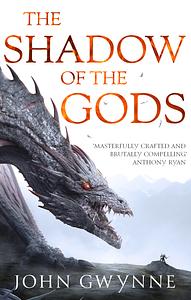Take a photo of a barcode or cover
I really wanted to love this book. Norse-inspired dark fantasy, old gods, grief-fueled quests—everything should have worked. But around 70% in, I found myself wondering if the story was going anywhere beyond three warbands all walking toward the same location.
The world is vivid and brutal, the prose rich, but sometimes it felt like I was wading through mud—literally and narratively. I struggled to connect with the characters emotionally, even when their arcs were deeply personal. Maybe the payoff comes in later books, but as a standalone? I’m not quite sure what this one was trying to say beyond “life is hard and vengeance is blood-soaked.”
Not a bad book by any means. Just… not the journey I hoped for.
The world is vivid and brutal, the prose rich, but sometimes it felt like I was wading through mud—literally and narratively. I struggled to connect with the characters emotionally, even when their arcs were deeply personal. Maybe the payoff comes in later books, but as a standalone? I’m not quite sure what this one was trying to say beyond “life is hard and vengeance is blood-soaked.”
Not a bad book by any means. Just… not the journey I hoped for.
adventurous
medium-paced
Plot or Character Driven:
Character
Strong character development:
Yes
John Gwynne's The Shadow of the Gods is a thundering debut of Norse-inspired fantasy, plunging readers into an exquisitely realized world where the fragmentary remains of deceased gods cause the earth to shake—and humanity struggles to stay alive amidst devastation left in their wake. With its dark settings, scarred battles, and deeply human cast of characters, the novel gives a gripping telling of Viking legend and the unhurried unravelling of destiny towards some memorable climax.
Set in the shattered world of Vigrið, once delineated by the immense, sacred war of gods long ago (or so we are told), the story has three main protagonists: Orka, a mother-of-war fighter seeking revenge; Varg, a runaway thrall with a tragic history; and Elvar, a nobleman turned mercenary seeking battle-glory and something else. Every perspective layers depth onto the vast universe, steeped in brutal traditions, mead-halls, and a respect—and fear—of the remnants of divine power.
What marks The Shadow of the Gods as different is less its obvious tribute to Viking culture—though saga-style storytelling, Old Norse words, and merciless codes of honor are wonderfully immersive—but how Gwynne uses this setting as a foundation on which to craft a slow burn. Rather than rushing towards war, the novel takes the time to lay the foundations: histories are hinted at, loyalties are tested, and the true price of interfering gods is revealed gradually. Such measured pace might prove challenging to those who expect constant activity, but it rewards by gradually raising the stakes through expertly maintained tension.
By the time the disparate character lines cross, the novel has intricately set up an emotional and thematic foundation for the final confrontation. The climax is brutal, purging intersection of myth, prophecy, and personal reckoning. Gwynne doesn't flinch from violence, but it's never gratuitous—it's raw, deliberate, and infused with the weight of choices made along the way.
Set in the shattered world of Vigrið, once delineated by the immense, sacred war of gods long ago (or so we are told), the story has three main protagonists: Orka, a mother-of-war fighter seeking revenge; Varg, a runaway thrall with a tragic history; and Elvar, a nobleman turned mercenary seeking battle-glory and something else. Every perspective layers depth onto the vast universe, steeped in brutal traditions, mead-halls, and a respect—and fear—of the remnants of divine power.
What marks The Shadow of the Gods as different is less its obvious tribute to Viking culture—though saga-style storytelling, Old Norse words, and merciless codes of honor are wonderfully immersive—but how Gwynne uses this setting as a foundation on which to craft a slow burn. Rather than rushing towards war, the novel takes the time to lay the foundations: histories are hinted at, loyalties are tested, and the true price of interfering gods is revealed gradually. Such measured pace might prove challenging to those who expect constant activity, but it rewards by gradually raising the stakes through expertly maintained tension.
By the time the disparate character lines cross, the novel has intricately set up an emotional and thematic foundation for the final confrontation. The climax is brutal, purging intersection of myth, prophecy, and personal reckoning. Gwynne doesn't flinch from violence, but it's never gratuitous—it's raw, deliberate, and infused with the weight of choices made along the way.
Really good story. It lays the foundation for the trilogy but doesn't get super deep into stories or flesh out the characters to where they need to be. But the trilogy is great and as the first book it's a must read.
dark
emotional
sad
tense
slow-paced
3.5 ⭐️ Fajne, bo podobne do "Ostrza" Abercrombiego, ale jak dla mnie gorsze, jeśli chodzi o bohaterów. Ocieka klimatem, tego jej nie odbiorę, ale światotwórczo jakoś tak nijak. Jak wyjdzie kolejny tom to sięgnę i zdecyduję, czy będzie mi się chciało kontynuować
adventurous
challenging
dark
mysterious
fast-paced
Plot or Character Driven:
A mix
Strong character development:
Yes
Loveable characters:
Yes
Diverse cast of characters:
Yes
Flaws of characters a main focus:
Yes
adventurous
dark
emotional
mysterious
tense
medium-paced
Plot or Character Driven:
A mix
Strong character development:
Yes
Loveable characters:
Yes
Diverse cast of characters:
Yes
Flaws of characters a main focus:
Complicated
Easily my new favorite book, easy to read and get absorbed into the world. All the characters are fleshed out well with clear motives, wants, and needs. So many little twists and turns, love it.
adventurous
dark
slow-paced
Plot or Character Driven:
A mix
Strong character development:
Yes
Loveable characters:
N/A
Diverse cast of characters:
N/A





